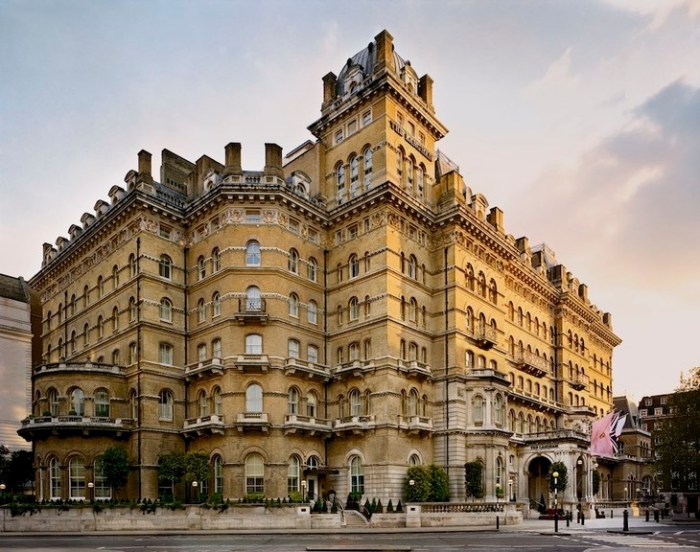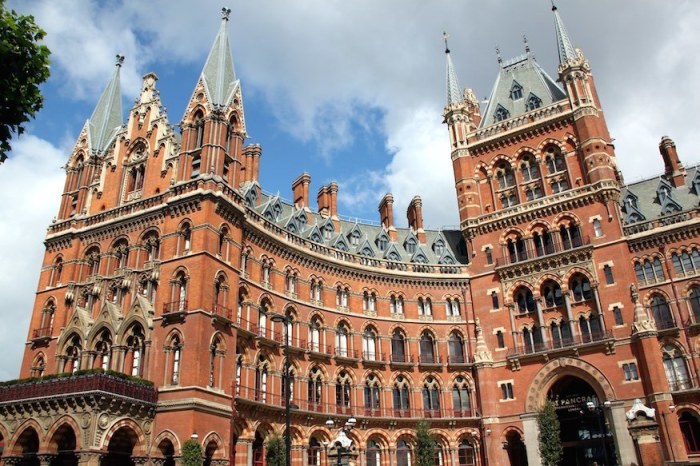
Historic Hotels in London sets the stage for this enthralling narrative, offering readers a glimpse into a story that is rich in detail and brimming with originality from the outset. From the oldest establishments to the architectural wonders, this exploration delves into the essence of London’s historic hospitality.
Overview of Historic Hotels
Historic hotels are defined by their rich heritage and historical significance, often stemming from their age, architectural style, or cultural importance. These hotels have stood the test of time and offer guests a unique glimpse into the past.
Historic hotels play a crucial role in preserving culture and heritage by maintaining the integrity of the buildings and spaces that hold historical significance. They provide a tangible link to the past, allowing visitors to experience a bygone era and learn about the traditions and stories that shaped a particular place.
Examples of Famous Historic Hotels
- The Ritz Hotel in Paris, France: Known for its luxurious accommodations and grand ballrooms, The Ritz Hotel has been a landmark in Paris since its opening in 1898.
- The Plaza Hotel in New York City, USA: A symbol of elegance and opulence, The Plaza Hotel has been a favorite among celebrities and dignitaries since its debut in 1907.
- The Taj Mahal Palace in Mumbai, India: Combining Indian and Moorish architectural styles, The Taj Mahal Palace has been an iconic destination for travelers since 1903.
Historic Hotels in London

London has a rich history of hospitality dating back centuries, with hotels playing a significant role in accommodating travelers from all over the world. Many historic hotels in London have stood the test of time, offering a glimpse into the city’s past and preserving its architectural heritage.
Brief History of Hotels in London
Hotels in London have a long history, with the concept of providing accommodation for travelers dating back to medieval times. The city’s strategic location as a hub for trade and commerce led to the establishment of inns and taverns to cater to merchants and visitors. Over the years, these establishments evolved into the grand hotels we see today, each with its own unique story to tell.
Oldest Historic Hotels in London
Some of the oldest historic hotels in London include The Ritz London, which opened in 1906 and has been a symbol of luxury and elegance ever since. Another iconic hotel is The Savoy, dating back to 1889 and known for its timeless glamour and famous guests. The Goring Hotel, established in 1910, is another historic gem that has retained its original charm and character.
Architectural Features of Historic Hotels in London
Historic hotels in London boast a variety of architectural styles, ranging from Victorian and Edwardian to Art Deco and modernist designs. Many of these hotels feature ornate facades, grand ballrooms, and intricate detailing that reflect the opulence of their time. The interior spaces are often adorned with period furniture, chandeliers, and artwork, creating a sense of luxury and nostalgia for guests.
Notable Historic Hotels in London

London is home to several historic hotels that have stood the test of time, each with its own unique stories and features that make them truly special.
The Ritz London
The Ritz London is one of the most iconic historic hotels in the city, known for its grandeur and luxury. Built in 1906, it has hosted royalty, celebrities, and dignitaries over the years. The hotel’s opulent décor and impeccable service have made it a favorite among the elite.
The Savoy
Another legendary hotel in London is The Savoy, which first opened its doors in 1889. It has a rich history and has welcomed famous guests such as Marilyn Monroe and Winston Churchill. The Savoy is also known for its stunning Art Deco design and world-class dining options.
The Langham
The Langham is Europe’s first “Grand Hotel”, founded in 1865. This historic hotel has a long list of notable guests, including Mark Twain and Oscar Wilde. The Langham is celebrated for its timeless elegance and exceptional service.
Comparison of Amenities
- Historic hotels often boast unique architectural features and period furnishings that provide a sense of nostalgia and charm.
- Modern hotels, on the other hand, focus on sleek and contemporary designs with state-of-the-art technology and amenities.
- Both types of hotels offer luxury accommodations, but historic hotels provide a glimpse into the past while modern hotels offer the latest comforts and conveniences.
Interesting Anecdotes
- The Beatles famously stayed at The Plaza Hotel in London during their first visit to the city in 1963.
- Winston Churchill used The Savoy as his base during World War II, holding secret meetings and strategizing with his advisors.
- The Ritz London is rumored to have a secret tunnel that leads to Buckingham Palace, allowing discreet passage for royal guests.
Preservation and Conservation
Maintaining historic hotels in a bustling city like London poses several challenges due to the pressures of urban development and modernization. These challenges highlight the importance of preserving the historical integrity of these iconic buildings and the role of conservation efforts in safeguarding them from potential threats.
Challenges of Preserving Historic Hotels
- Adapting to modern building codes and regulations while preserving the original architectural features.
- Managing wear and tear on aging structures and ensuring they meet modern safety standards.
- Balancing the need for updates and renovations with the desire to maintain the historical charm of the hotel.
Importance of Maintaining Historical Integrity
- Preserving the unique character and heritage of historic hotels contributes to the cultural identity of a city like London.
- Ensuring that future generations can experience and appreciate the history and craftsmanship of these buildings.
- Attracting visitors who seek out authentic and historic accommodations for a memorable stay.
Role of Conservation Efforts
- Implementing conservation strategies to protect historic hotels from being demolished or drastically altered.
- Working with preservation organizations and local authorities to secure funding for restoration projects.
- Educating the public about the significance of these hotels and the importance of preserving them for future generations.
As we conclude our journey through the grandeur of London’s historic hotels, one cannot help but marvel at the intertwining of past and present within these magnificent structures. Each brick and corridor holds a tale of its own, encapsulating the essence of a bygone era amidst the bustling modernity of the city.
Detailed FAQs
What defines a hotel as ‘historic’?
A hotel is considered historic based on its age, architectural significance, cultural heritage, and historical relevance.
What are some challenges in preserving historic hotels in London?
Preserving historic hotels in a modern city like London faces challenges such as maintaining structural integrity, meeting modern safety standards, and balancing preservation with necessary updates.
How do historic hotels in London compare to modern ones in terms of amenities?
Historic hotels in London may offer fewer modern amenities compared to their contemporary counterparts but provide a unique charm and historical ambiance that modern hotels often lack.





